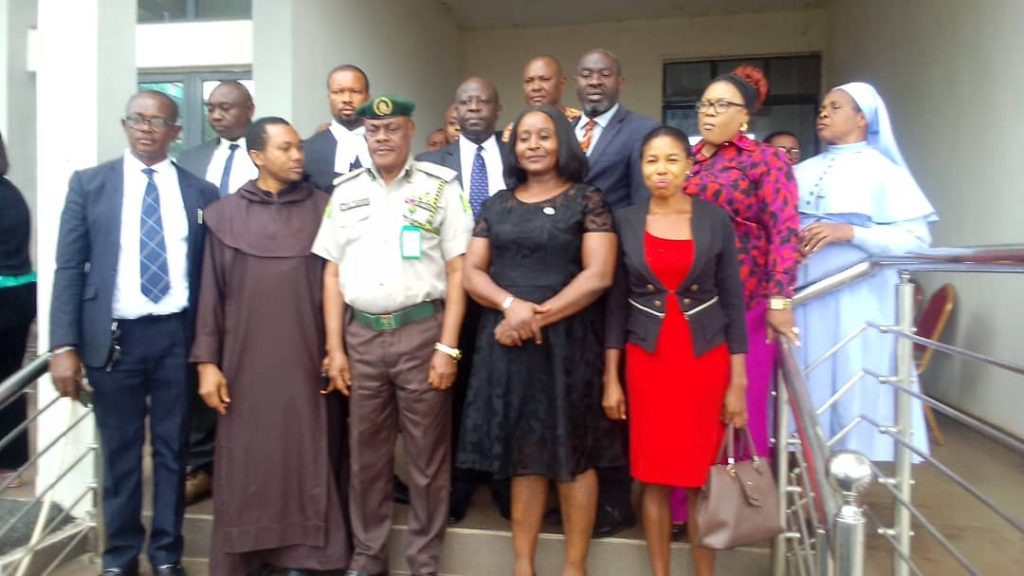Ben Ezechime, Enugu
The Carmelite Prisoners’ Interest Organisation (CAPIO), Ministries, Departments and Agencies (MDAs) in Enugu State have taken up a commitment to ensure the full operationalisation of community service sentencing in the state.
CAPIO, a Misean Cara supported religious organisation and Enugu State MDAs made the resolve at a One-Day High-Level Stakeholders Consultative Forum on Operationalisation of Community Service Sentencing in Enugu State Justice System.
The Consultative Forum was organised by the Enugu State Ministry of Justice in partnership with CAPIO and Enugu State Justice Reform Team (ESJRT).
Declaring the Forum open on in Enugu, the Chief Judge of Enugu State, Justice Raymond Ozoemena, said that the judiciary in Enugu State gives matters of judicial review and correctional centre decongestion top priority.
Ozoemena, who was represented by Justice C.V.C. Ezeugwu, noted that the judiciary was giving its 100 per cent support to the operationalisation of community service sentencing in the state.
According to him, operationalisation of community service sentencing in the state has numerous benefits to the offender, the community, the judicial, the legal and the law enforcement institutions and the government at all levels.
Ozoemena said: “I must commend CAPIO and stakeholders in the judicial system of the state for coming out with an easy and implementable operational framework for the operationalisation of community service sentencing in the state.
“We are also grateful to various faith-based missions and organizations for their continuous and age-long contributions to reformation and decongestion of correctional centres within Enugu State and the country at large.”
Corroborating, the state’s Attorney General and Commissioner of Justice, Dr Kingsley Udeh, said that the forum was intended to harmonise the criminal justice system of the state as well as ensure greater deterrent and community involvement.
“The operationalisation of community service sentencing in the state will definitely reduce number of inmates in correctional centres as well as lead to better and efficient correctional centres management in the state.
“This move should be supported holistically by all stakeholders for the state to reap its maximum benefits,” Udeh, who was represented by the Director of Civil Litigation, Chief Ikechukwu Ezewukwa, said.
Speaking, the Controller of Corrections in Enugu State, Mr Nicholas Obiakor, said that the Nigerian Corrections Service (NCoS) had started full implementation of non-custodian sentencing and service for two years in the state.
Obiakor said that community sentencing service, which is one aspect of non-custodian service, would be given all the necessary support for it to succeed and strive in the state in order to decongest the correctional centres.
Contributing, the state’s Commissioner for Youths and Sports, Mr Lloyd Ekweremadu, lauded CAPIO for the initiative and hard work put in to finally get an operational framework for the operationalisation of community service sentencing in the state.
Ekweremadu, who spoke on behalf of the implementing MDAs, said that the move would quickly reform and restore youths who find themselves in the wrong side of the law and “deter them from repeating such mistakes as they grow.”
He said: “We must be able to separate minor offenders from major offenders. For the minor offenders you give them community work that will draw them closer and correct them with love and care.
“This will ensure that our judicial system is focused on reformation and restoration rather than being punitive and vindictive as well as our correctional centres having few inmates while man-power, cost and space constraints will be reduced.”
Ekweremadu, who said that he took time to go through the operational framework, said that there was a need to incorporate electronic tagging on those serving community sentencing to reduce human efforts watching over them.
Earlier, Justice Chris Onyia (retired), representing Enugu State Justice Reform Team (ESJRT), said that the reform of the Administration of Criminal Justice Law (ACJL) using community service sentencing was to ensure that minor offenders do not mix-up with hardened criminals.
Archbishop Emmanuel Chukwuma, Emeritus Archbishop of Anglican Diocese of Enugu, lauded CAPIO for the initiative while charging justice stakeholders to ensure that minor offenders with bailable charge or fines do not end up in correctional centres for any reason.
“I am calling on the Federal Government to do more in the environment, welfare and well being of correctional centres to ensure that inmates have a sense of belonging and love towards the society and be better humans,” Chukwuma said.
In a remark, Executive Director of CAPIO, Rev. Fr. Jude Isiguzo, said that the forum was meant to get all implementing MDAs, who are stakeholders, to read and brainstorm on the developed framework for the operationalisation of community service sentencing.
Isiguzo said that very soon desk officers in each MDAs in-charge of offenders serving community sentencing would be trained and equipped with framework for the operationalisation of community service sentencing for further understanding.
He said that his organisation over some months had involved all stakeholders in the judicial and law enforcement systems of the state on what community sentencing is all about and its enormous benefits to all even to the minor offender.
“So, today, we are partnering with the Ministry of Justice to create more awareness and present the developed framework and also secure your commitments towards a successful implementation of community service sentencing in Enugu State.
“The need for this is in line with the commitment of His Excellency, Gov. Peter Mbah, to decongest the correctional centres in Enugu State,” he added.

